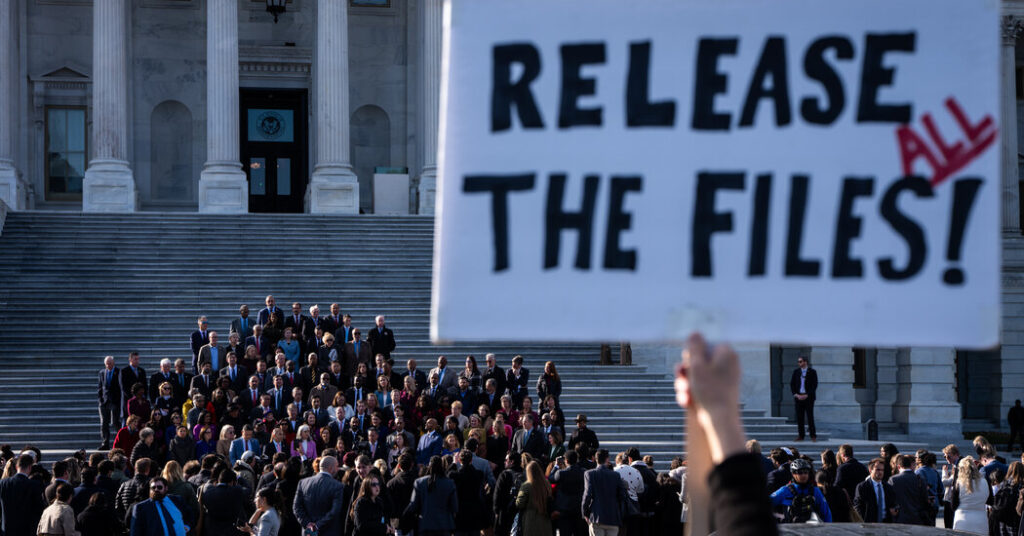President Trump denounced calls for the release of the Epstein files as a Democratic hoax. He dispatched aides to warn Republicans that backing it would be seen as a “hostile act.” He placed personal calls to those who dared to do so, and even dispatched his attorney general and F.B.I. director to meet with one in the White House Situation Room in efforts to get her to flip.
In the end, none of it worked. And on Sunday night, Mr. Trump did something he has rarely been forced to do: He caved in the face of pressure from his party and called on House Republicans to go ahead and back a bill that would order his Justice Department to release all of its investigative files on the convicted sex offender Jeffrey Epstein.
By Monday, he was saying, “Sure,” he would sign the legislation he has spent months trying to kill.
It’s not clear that doing so would have any concrete impact; Mr. Trump could have ordered the release of the files without an act of Congress, and has not. And it remains to be seen whether his Justice Department will ultimately release the files.
But his reversal has opened the floodgates of Republican backing for the bill, which is expected to come to a vote in the House as early as Tuesday and appears likely to pass unanimously. It has also raised questions about Mr. Trump’s ability to impose his will on Republicans and the nation, suggesting a slip in his iron grip on his party amid his falling polling numbers, rising prices and rifts within his political coalition.
For the first 10 months of his presidency, Mr. Trump has steered the narrative and bullied Congress into doing whatever he wanted with almost no pushback. But as Republicans gear up for midterm elections and some begin to plot a future after Mr. Trump, the Epstein episode is a rare instance in which he has lost control.
For months, House Republicans had dreaded the prospect of a vote on releasing the Epstein files. Such a moment would leave them torn between pressure from a fervent base demanding that they support the release of the files and a vengeful president who was demanding the opposite.
Mr. Trump’s about-face was a bow to the inevitable that came after it had become clear that many, if not most, Republicans were planning to support the measure, wary of appearing to aid in a coverup for a sex offender.
“As long as Democrats and President Trump both are calling for the release, I can’t imagine anyone not voting to release,” Representative Lance Gooden, Republican of Texas, said in a text message. “I predict 100 percent will vote to release.”
Even Representative Troy Nehls, Republican of Texas, was now on board, just days after he wrote on social media that he would be a hard “no” on the release of the “Epstein hoax,” designed by Democrats to “distract us from the winning of President Trump and his administration.” He said in a text message on Monday that he would vote to release the files.
Mr. Trump’s turnabout came after private conversations with Republicans, who warned him that they would have to vote to release the files because of pressure from their constituents. In those conversations, according to a person briefed on them who insisted on anonymity to discuss them, Mr. Trump acknowledged that the vote was now an inevitability, and that if they needed to support it they should do so. And he listened to Republicans who told him that his opposition was making it seem like he had something to hide.
In the end, Mr. Trump did not want to lose.
So on Sunday night, the president drafted a post for Truth Social while flying aboard Air Force One from Florida to Washington, reversing course.
“House Republicans should vote to release the Epstein files,” he wrote, “because we have nothing to hide, and it’s time to move on from this Democrat Hoax.”
Mr. Trump was forced to make the pivot because he failed to sway three Republican women who had signed onto a petition that would force a vote on the bill, which would compel the Justice Department to release all of its files on Mr. Epstein within 30 days. After the petition received 218 signatures, a House majority, the rules required an eventual vote, and Speaker Mike Johnson said he would call one this week.
Representative Ro Khanna, the California Democrat who is a co-sponsor of the measure, said that the vote would be an extraordinary example of a unique coalition standing up to Mr. Trump, with the backing of his MAGA base.
“In 48 hours, we went from the president threatening to un-endorse Republicans and hauling them into the Situation Room to his surrendering to math,” said Mr. Khanna, who also predicted a unanimous vote.
That is in part because the measure has the backing of Representative Thomas Massie, Republican of Kentucky, who is often the lone dissident who breaks with his party to oppose legislation that Mr. Trump urges the conference to support. In this case, Mr. Massie is running the show: He and Mr. Khanna are co-sponsors of the Epstein transparency bill.
In his second term, Mr. Trump has tested not only norms, but also rules and laws, taking a metaphorical wrecking ball to institutions that have often bent to his will. The Epstein files have become the unusual case in which a bipartisan pair of lawmakers, with support from a tiny group of hard-right Republicans, found a way to use House rules to make it impossible for him to get his desired outcome. So on Sunday night, he changed his desired outcome.
On Monday, Mr. Trump sounded eager to move past the episode and worried about the impact it could have on him and his party.
“Let anybody look at it, but don’t talk about it too much, because honestly I don’t want to take it away from us,” Mr. Trump told reporters in the Oval Office, calling the Epstein files “a Democrat problem.” “The whole thing is a hoax, and I don’t want to take it away from really the greatness of what the Republican Party has accomplished over the last period of time.”
Asked whether he would sign the measure, he told reporters, “Sure I would.”
That raised renewed questions about whether Senator John Thune, Republican of South Dakota and majority leader, would bring the bill to a vote in that chamber. Mr. Thune had previously hinted that moving ahead with a vote was not a priority.
But a unanimous House vote — or even a lopsided one — in favor of releasing the files would place enormous pressure on him to allow the bill to be considered in the Senate.
Senator Jacky Rosen, Democrat of Nevada, wrote to Mr. Thune last week urging him to quickly schedule a vote.
Annie Karni is a congressional correspondent for The Times.
The post Trump Bows to Reality in Epstein Reversal, Beating a Rare Retreat appeared first on New York Times.




